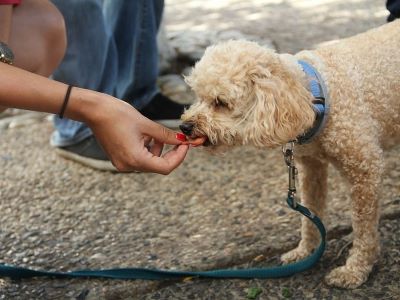We enjoy sharing treats with our furry friends but want to ensure it’s safe for our pet’s consumption. So, we often search online to check if a particular treat is okay for our pets. For instance, you might have searched: “Can Dogs Have Apricot?” And here we are.
Let’s explore the valleys and determine if this sweet treat is good for your pup.

Can Dogs Have Apricot?
Apricots are stone fruits belonging to the same family as plums, peaches, cherries, and almonds. It is usually yellow or yellowish-orange in color. This fruit originated in China but, is now grown in almost all continents except Antarctica[1].
Sometimes you may wonder if you may look at your pet dog and wonder if it will eat anything. From feces, and garbage to their favorite chew toys. For reasons not set in stone, dogs like to taste and explore. Dogs do have taste buds, but their sense of taste is not as developed as ours is. They can taste spicy, sweet, sour, bitter, and salty foods just like us.
“Sweet flavors are especially preferred by dogs, which likely stems from their ancestral diet including wild fruits and vegetables,” writes Dr. Teresa Manucy from PetMD. “However, this does not mean that they should overindulge in pet-safe fruits and veggies.“
Apricots are sweet and they contain vitamins A and C, so they help your pet reduce inflammation and improve eyesight. They are especially helpful in retaining shine in your pet’s fur. It also contains potassium which can improve nerve and muscle functioning. So, Apricot is a healthy treat for your pet from time to time.
How To Feed Apricot To Your Pup?
The fruit itself is not toxic to dogs, in fact has multiple benefits when given in adequate proportions. Apricot contains fiber so serving bigger proportions can cause digestive issues. However, the stem, leaves, and pit contain cyanide which can prove to be poisonous for dogs.
If you’re introducing apricot to your pooch for the first time, only give a little and monitor for any signs of allergies. The same goes for whenever you introduce new foods. Signs may include itchiness, lethargy, panting, and weakness. It is best to consult your local vet to weaken the symptoms.
There are many ways to serve apricot. You can choose to puree it with other food items in case you are unsure if your pet will like it. Freezing small slices is another way. It ensures that the fruit doesn’t become a choking hazard and is a great summer popsicle. Feeding sliced small chunks is always a great option.

You can always choose to bake apricot into dog treats, it has a sweet-tart tang to it that your pooch is sure to enjoy. And at the end of the day, you can use small bites of apricots to garnish your dog’s main meal. This is easier to incorporate into their diet. It will make it more enjoyable for your pet.
Other Apricot Items
It is recommended to only give fresh apricots to your pet. Dried Apricots are acceptable as well. As a matter of fact, they contain more nutrients compared to fresh ones. However, canned apricots are a big no. The same goes for apricot jams. It contains high sugar and can cause various health issues like changes in metabolism, upset stomach, and more. Sugary items will make your pet hyperactive and can cause it to develop diabetes.
Apricot cheese and yogurt are not at all harmful to your dog when given in small quantities. However, if they are lactose intolerant it’s best to keep them apart. Apricot Nectar is again high in sugar. Oil made for Apricots is harmful as it is made from the kernels (pit) and may contain some traces of cyanide. Cyanide although it tastes sweet is poisonous for your pet.
You must teach your dog not to go near the refrigerator or pantry[2] and to refuse food from strangers. This training although tough, will not only keep your dog safe but also prevent them from developing unhealthy eating habits.

FAQs
Can dogs have apricot?
Apricots are a safe and healthy fruit option for dogs. They are abundant in vitamins A and C, which support healthy joints and eyesight in addition to giving your dog’s fur a glossy shine. Additionally, apricots are high in potassium, which is essential for maintaining proper bodily functions in your pet.
How many apricots can dogs eat?
It is safe for your dogs to consume apricots, be it dry or natural. However, apricots contain dietary fiber. As a result, giving your pets too many apricots could cause them to become constipated or have diarrhea.
Can dogs eat dried apricots?
Dried apricots are completely safe to consume. Drying fruits make it higher in nutrients, phytochemicals and bioactive compounds and can make for a great natural treat. Vitamins A and C help with eyesight and maintain glossy fur.
Can my dog drink apricot juice?
Apricot juice contains added sugar and is harmful to your pup. It can make your pup hyperactive and in the long run, can cause diabetes. Serving apricots in their natural form is much preferable. Apricots are rich in nutrients and vitamins.
Can dogs eat apricot jelly?
Because apricot jelly or jam contains a lot of sugar, it is bad for pets as well as owners. Apricots in their natural form and even dried ones are much healthier and can provide added benefits of nutrients and vitamins.
Conclusion
We pet owners wish to share people treats with our pets and fairly so. They are our best furry friends. Unfortunately, only some are safe for their consumption. Fortunately, apricots, the most beautiful fruit is safe for your pup’s consumption.
We hope this gives some clarity to your question: “Can Dogs Have Apricot?” So, don’t be shy, pass a slice of apricot to your pet.
References:
- Apricot | Description, Tree, Plant, Fruit, & Facts. Encyclopedia Britannica.
- Boundary training: keeping your dog inside the yard or outside a room. American Kennel Club.



